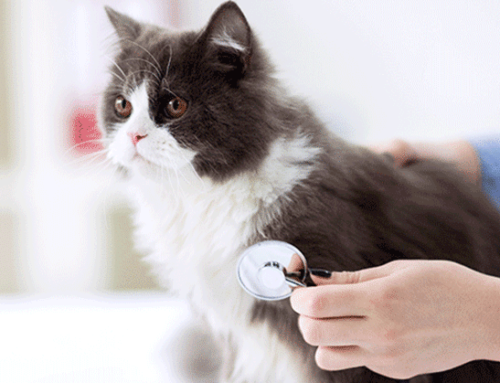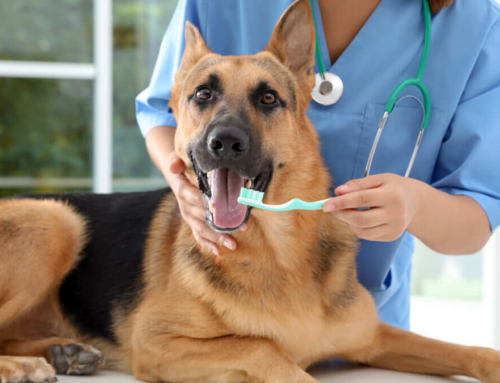Summer continues with sunshine, warm weather and family fun this month! This is the season when families often expand as well; with little human and fur-babies alike.
Veterinary clinics notice that this is the time of year when most pet adoptions happen, and first-time owners often have a lot of questions about their new puppy or kitten and how they should best take care of them.
Surgery might not be at the top of their minds, but the choice to spay or neuter a young animal is an important responsibility for new guardians. Let’s demystify these procedures so that owners can make an informed and confident choice for their pets!
Definitions: what is a “spay” or “neuter”?
The sterilization of a pet is a surgical procedure that is gender specific:
- The spay procedure, also known as an “ovariohysterectomy”, is the removal of the ovaries, fallopian tubes and uterus in females.
- The neuter procedure, also known as “castration”, is the removal of the testes in males.
 Veterinarians generally advise that all young animals should be spayed or neutered unless they are to be used for breeding. The low risk of the elective surgery generally outweighs the risks of health complications later in life. That said, a veterinarian must first do a physical exam and review all the history the owners can provide to ensure the little patient is in good health.
Veterinarians generally advise that all young animals should be spayed or neutered unless they are to be used for breeding. The low risk of the elective surgery generally outweighs the risks of health complications later in life. That said, a veterinarian must first do a physical exam and review all the history the owners can provide to ensure the little patient is in good health.
Female dogs should be spayed at around six months of age before they are sexually mature enough to have entered their first “heat” cycle. Male dogs can be neutered between five to seven months of age, depending on when their testicles have descended (large breed dogs can take longer to mature).
Both and male and female cats are usually ready for their procedures at five to six months of age.
Unaltered life…
What is it like to keep an unaltered pet at home? While some of these issues will not be true for all owners, it is important to be able to recognize these behaviours when they arise.
The most apparent behavioural trend we see with unaltered dogs and cats is that they tend to be more aggressive and physical towards people and animals alike.
Since unneutered males still have their testes, they produce large amounts of testosterone from their endocrine glands. Testosterone is a hormone that indirectly causes more physical and aggressive traits to appear in due to the drive to find and compete for a mate.
In male dogs, their sex drive can result in “humping” activity; be it with other animals, household furniture, or (embarrassingly) your leg. Marking behaviour is common to cats and dogs both, but unneutered male cats tend to “spray” urine outside of their litter boxes, marking their household and neighbourhood territory. Males of both species will also have a drive to roam away from home and be less interested in their guardians, following the urge to seek out a lady friend.
Females will also be subject to changes in temperament due to their estrus or “heat” cycle. Their moods may fluctuate and seem more unpredictable if you are not sure what stage they are in.
A dog’s cycle can last up to 3 weeks and occur every 4 months or once every year. They will also go through a “period” where owners might notice blood spotting, which is difficult to keep clean in some houses. Cats go into heat for about 2 weeks during spring and winter, with minimal or no bleeding. It’s not hard to know when a cat is in heat though; they often exhibit obvious body language, like pointing their rear end to the sky and becoming more vocal for attention.
What are the benefits of surgery?
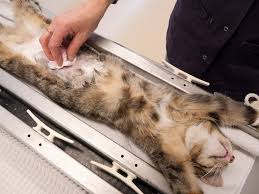 Largely, the main incentive to neuter or spay your pet is so that it will not reproduce, especially without your knowledge. Unaltered outdoor cats that free roam outside are the culprits of the overpopulation of strays that sadly might never have comfortable homes and care.
Largely, the main incentive to neuter or spay your pet is so that it will not reproduce, especially without your knowledge. Unaltered outdoor cats that free roam outside are the culprits of the overpopulation of strays that sadly might never have comfortable homes and care.
An unplanned-pet-pregnancy puts your female pet at unnecessary risk of health complications and results in young that require huge amounts of cleaning, feeding and expensive medical check-ups before they are old enough to be placed in a home of their own.
The second and arguably equally important, reason to consider spaying/neutering is to give your pet the best chance at a long and healthy life. There are demonstrable health risks for both males and females that are never altered: males are more likely to develop prostate tumours and females are at risk of mammary tumours and uterine infection, called a pyometra. Since these conditions usually appear later in life, the risks of surgery to remove tumours is increased and causes avoidable suffering and expense.
And remember those less-than-desirable behaviours we discussed earlier? Some natural processes like a female’s heat cycle can be curtailed before it ever begins. Other competitive behaviours in males can be reduced, although the outcome may vary on the personality of the pet and how ingrained the habits have become. At the very least, male urine has a noticeably less foul smell which makes a big difference in cat households.
Debunking some misconceptions
Pet guardians that are hesitant towards surgery have often heard some of the same cautionary tales regarding personality changes, weight gain and sense of pride.
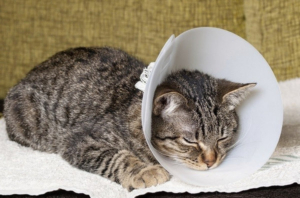 There is no need to fear that your funny/quirky/loving young pet will have a total personality change as a result of a spay/neuter. As we discussed earlier, some behaviours related to their reproductive drive may be subdued, but their overall happiness is not at risk. They are still developing their personalities through experience, and the change in their hormone production through surgery does not usually result in any depressive phases or dramatic mood changes.
There is no need to fear that your funny/quirky/loving young pet will have a total personality change as a result of a spay/neuter. As we discussed earlier, some behaviours related to their reproductive drive may be subdued, but their overall happiness is not at risk. They are still developing their personalities through experience, and the change in their hormone production through surgery does not usually result in any depressive phases or dramatic mood changes.
Keeping your pets at a healthy weight is a responsibility that guardians can find challenging, but keep in mind that weight control is achieved through calorie measurement and energy output. A spayed or neutered dog will not automatically be put on a slope towards uncontrollable obesity. While the incidence of altered pets being overweight may be higher, there is a solution for every problem case that your veterinarian or nutritionist can help find!
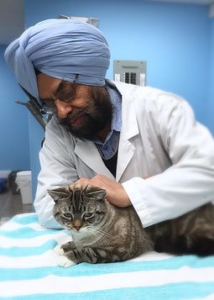 The last misconception we come across is that spaying/neutering is a point of shame for your pet and that it will make them feel less “manly” or “ladylike” after the procedure. This is more of an opinion than a measurable outcome – but consider that these are more abstract, human concepts and our pets do not likely feel this level of self-awareness. Unaltered pets are simply pursuing the urge to reproduce, which is not necessarily the only way for them to have a happy, healthy and fulfilled life. Their human family can and should provide them with loving companionship and adventure enough to last their lifetime!
The last misconception we come across is that spaying/neutering is a point of shame for your pet and that it will make them feel less “manly” or “ladylike” after the procedure. This is more of an opinion than a measurable outcome – but consider that these are more abstract, human concepts and our pets do not likely feel this level of self-awareness. Unaltered pets are simply pursuing the urge to reproduce, which is not necessarily the only way for them to have a happy, healthy and fulfilled life. Their human family can and should provide them with loving companionship and adventure enough to last their lifetime!
While they might be very common procedures, any veterinarian should be happy to explain the details and their professional opinion about what is best for your dog or cat.
We here at Central Park Animal Hospital will always try our best to educate and inform our clients about the whole procedure including cost, pre-care and post-care of their pet, to ensure that both the client and new pet walk home happy and healthy.




